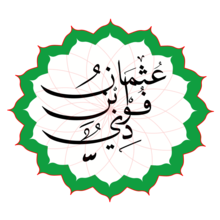Usman dan Fodio
| Usman dan Fodio | ||
|---|---|---|
 | ||
| Información personal | ||
| Nacimiento |
15 de diciembre de 1754 Gobir | |
| Fallecimiento |
1817 Sokoto (Nigeria) | |
| Religión | Islam | |
| Familia | ||
| Hijos | Nana Asma'u | |
| Información profesional | ||
| Ocupación | Escritor, filósofo y poeta | |
| Cargos ocupados | Sultan of Sokoto | |
Shaihu Usman dan Fodio (en árabe: عثمان بن فودي ، عثمان دان فوديو), nacido Usuman ɓii Foduye y también conocido en ocasiones como Shaikh Usman Ibn Fodio, Shehu Uthman Dan Fuduye o Shehu Usman dan Fodio (1754–1817), fue el fundador del Califato de Sokoto en 1809, profesor religioso, escritor y propagandista islámico. Dan Fodio formaba parte de la etnia fulani urbanizada que vivía en los estados hausa, en lo que es actualmente el norte de Nigeria.
Biografía
Nació sobre 1754 en Maratta, actualmente en Nigeria, en la etnia fulani.
Se dio a conocer como predicador religioso. El soberano del estado haussa de Gobir, Yunfa, le consideraba una persona peligrosa, por lo que intento asesinarlo en 1802. Como respuesta, el orador religioso lanzó contra su estado una campaña militar, conocida como Yihad Fulani, entre 1804 y 1808.
Dan Fodio derrotó a los hausas y destruyó Gobir en 1808, sometiendo diversos territorios próximos hasta alcanzar el norte del actual Camerún, con lo que creó un nuevo estado musulmán, el Imperio Fulani, el cual se correspondería hoy día principalmente con el norte de Nigeria. Se proclamó entonces emir de los creyentes (amir al-muminin). En 1810, en una nueva campaña, sometió el estado de Liptako, en el Alto Níger. Fracasó, no obstante, en su intento de ataque (1808-1810) en el este sobre el antiguo sultanato de Bornú, en las orillas del lago Chad. Sus tropas fueron vencidas por Mohamed El-Kanemi, valido del sultán.
Estableció su capital en Sokoto. Estimuló el crecimiento del Islam en todas las regiones y fundó el importante Califato de Sokoto.
Escritura
Usman dan Fodio escribió cerca de 480 poemas en árabe, fula y hausa.[1]
Véase también
Referencias
- ↑ Yahaya, Ibrahim Yaro. 1988. "The Development of Hausa Literature." in Yemi Ogunbiyi, ed. Perspectives on Nigerian Literature: 1700 to the Present. Lagos: Guardian Books, as cited in Obafemi, Olu. 2010. "50 Years of Nigerian Literature: Prospects and Problems" Keynote Address presented at the Garden City Literary Festival, at Port Harcourt, Nigeria, 8-9 Dec 2010
Bibliografía
Fuentes primarias
- Writings of Usman dan Fodio, in The Human Record: Sources of Global History, Fourth Edition/ Volume II: Since 1500, ISBN 0-6`8-04247-4 (page:233-236)
- Asma'u, Nana. Collected Works of Nana Asma'u. Jean Boyd and Beverly B. Mack, eds. East Lansing, Michigan: University of Michigan Press, 1997.
Otras fuentes secundarias
- Mervyn Hiskett. The Sword of Truth: The Life and Times of the Shehu Usuman Dan Fodio. Northwestern Univ Pr; 1973, Reprint edition (marzo de 1994). ISBN 0-8101-1115-2
- Ibraheem Sulaiman. The Islamic State and the Challenge of History: Ideals, Policies, and Operation of the Sokoto Caliphate. Mansell (1987). ISBN 0-7201-1857-3
- Ibraheem Sulaiman. A Revolution in History: The Jihad of Usman dan Fodio.
- Isam Ghanem. The Causes and Motives of the Jihad in Northern Nigeria. New Series, Vol. 10, No. 4 (Dec., 1975), pp. 623–624
- Usman Muhammad Bugaje. The Tradition of Tajdeed in West Africa: An Overview . Paper Presented to the International Seminar on the Intellectual Tradition in the Sokoto Caliphate and Borno. Organized by the Center for Islamic Studies, University of Sokoto from 20–23 June 1987.
- Usman Muhammad Bugaje. The Contents, Methods and Impact of Shehu Usman Dan Fodio's Teachings (1774-1804)
- Usman Muhammad Bugaje. The Jihad of Shaykh Usman Dan Fodio and Its Impact Beyond The Sokoto Caliphate . A Paper to be read at a Symposium in Honour of Shaykh Usman Dan Fodio at International University of Africa, Khartoum, Sudan, from 19–21 November 1995.
- Usman Muhammad Bugaje. Shayikh Uthman Ibn Fodio and The Revival of Islam in Hauseland. (1996).
- Helen Chapin Metz, ed. Nigeria: A Country Study. Washington: GPO for the Library of Congress, 1991.
- B. G. Martin. Muslim Brotherhoods in Nineteenth-Century Africa. 1978.
- Jean Boyd. The Caliph's Sister, Nana Asma'u, 1793-1865: Teacher, Poet and Islamic Leader.
- Nikki R. Keddie. The Revolt of Islam, 1700 to 1993: Comparative Considerations and Relations to Imperialism. in Comparative Studies in Society and History, Vol. 36, No. 3 (Jul., 1994), pp. 463–487
- R. A. Adeleye. Power and Diplomacy in Northern Nigeria 1804-1906. 1972.
- Hugh A.S. Johnston . Fulani Empire of Sokoto. Oxford: 1967. ISBN 0-19-215428-1.
- S. J. Hogben and A. H. M. Kirk-Greene, The Emirates of Northern Nigeria, Oxford: 1966.
- J. S. Trimgham, Islam in West Africa, Oxford, 1959.
- 'Umar al-Nagar. The Asanid of Shehu Dan Fodio: How Far are they a Contribution to his Biography?, Sudanic Africa, Volume 13, 2002 (pp. 101–110).
- Paul E. Lovejoy. Transformations in Slavery - A History of Slavery in Africa. No 36 in the African Studies series published by Cambridge University Press, ISBN 0-521-78430-1
- Paul E. Lovejoy. Fugitive Slaves: Resistance to Slavery in the Sokoto Caliphate, In Resistance: Studies in African, Caribbean, and Afro-American History. Gary Y. Okihiro - editor. University of Massachusetts: Amherst, MA. (1986).
- Paul E. Lovejoy, Mariza C. Soares (Eds). Muslim Encounters With Slavery in Brazil. Markus Wiener Pub ( 2007) ISBN 1-55876-378-3
- F. H. El-Masri, “The life of Uthman b. Foduye before the Jihad,” Journal of the Historical Society of Nigeria (1963), pp. 435–48.
- M. A. Al-Hajj, “The Writings of Shehu Uthman Dan Fodio”, Kano Studies, Nigeria (1), 2(1974/77).
- David Robinson. "Revolutions in the Western Sudan," in Levtzion, Nehemia and Randall L. Pouwels (eds). The History of Islam in Africa. Oxford: James Currey Ltd, 2000.
